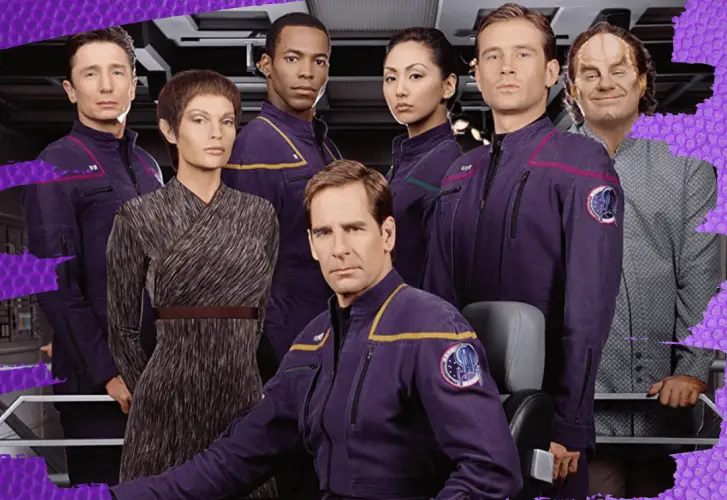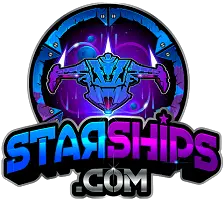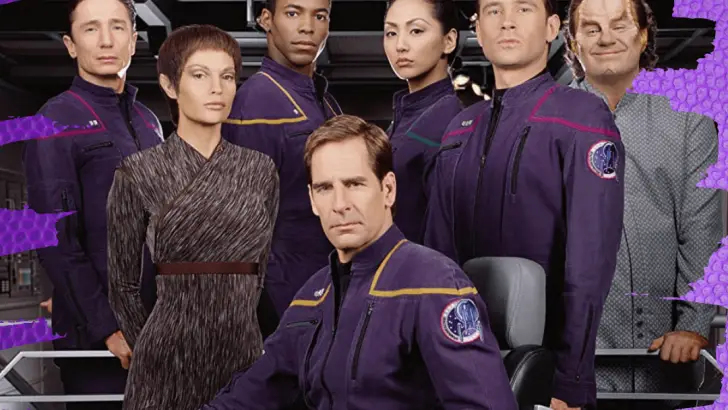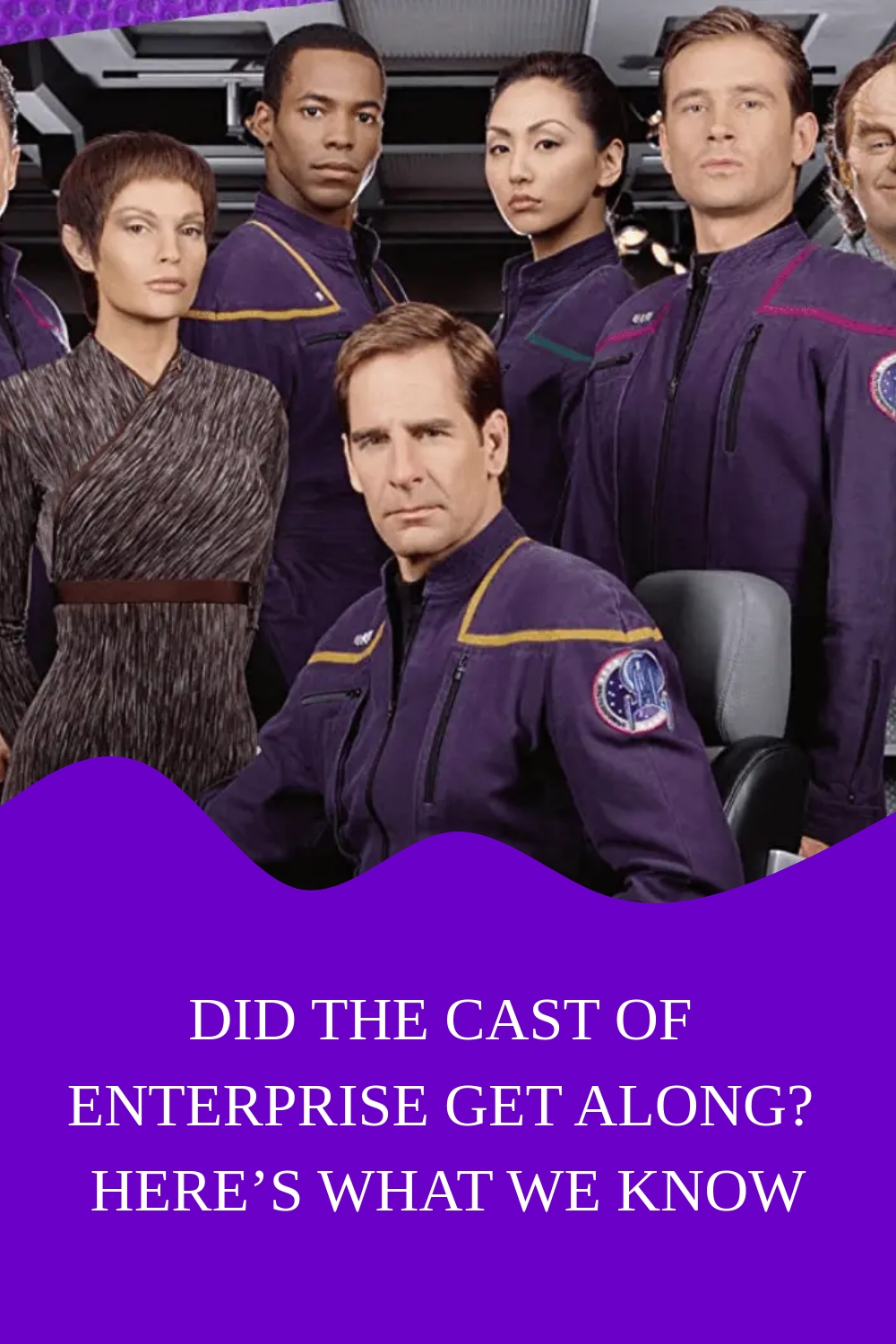Star Trek: Enterprise was a prequel to the Original Series (TOS) set 100 years before James Kirk made his debut with the Constitution-class Enterprise, but fans didn’t widely receive it due to failed expectations. The negativity surrounding the series took its toll on the producers, writers, directors, and of course, the cast. But did the Enterprise cast get along?
While the cast disagreed with how the show was produced or the episodes’ direction, they enjoyed working with each other. They admired the professionalism of Scott Bakula. At the reunion, they recounted many fun times they had together while working on the show.
Let’s get started learning the following trivia:
- How the series should have been,
- How the cast members were chosen, and
- Why the series was canceled.
The History of Enterprise’s Production

When Star Trek: Enterprise was canceled, there was a mixed reaction among fans and critics alike. While the critics thought that the cancelation was too long in coming, many fans claimed that it was just starting to get better and that they needed to continue with seven seasons like other series in the franchise had. But Enterprise killed the Star Trek franchise for 12 years, and there was not another series on the air during that time.
How Did Enterprise Kill the Star Trek Franchise?
Enterprise was supposed to be this grand prequel that explained the beginnings of Starfleet, the Federation, and how humans began exploring the galaxy in the early days after Zefram Cochrane flew his first warp-capable ship. It was supposed to be a series that explored several different concepts within the Star Trek universe. But it didn’t deliver on its promises.
Instead, they used gimmicks to get ratings and accolades that the other series got during their run from the beginning of the series. They didn’t use the spirit of Star Trek and the amazing human spirit that made Star Trek what it came to be known for, which created low ratings by the end of the first season.
They also used talented actors as extras rather than main characters, which was a waste of their talents, and it helped to kill the series. For example, Scott Bakula’s companion actor on Quantum Leap, Dean Stockwell, was cast as a “warden” of sorts in a detainment center. While he did his best on the character, he could have been cast in a way that would have made the series better received.
By halfway through the last season, the storylines and episodes began matching the spirit that made Star Trek so great. But it was too late, and the series was canceled at the end of the fourth season.
Despite the reboot movies that didn’t get full licensure from Star Trek as canon, there were no other series from 2005 until 2017 when the new series Discovery first aired. In 2005, many fans were disappointed and were turned off to any new movies or series.
But 12 years later, there was a resurgence in interest in the new series. Some people attribute this to the demise of Enterprise.
Look at the Beginning
Where did the demise start? By not putting the same amount of effort and passion into the series they did to prior series, they doomed it to failure.
Starting with the name, the director felt that adding Star Trek to the front of it would be redundant because true fans would find it, watch it, and love it. It wasn’t until the third season that they added that back in as an attempt to boost the ratings.
It was meant to be a prequel, but instead, it went completely off course with various storylines that didn’t explain too many later storylines, which sealed its early demise.
Star Trek: Enterprise Was Character-Driven
While the prior series focused on the adventures and the characters, Enterprise was more about the characters. Voyager, for example, was about a crew getting back home to the Alpha quadrant. Along the way, they encounter different species and problems while tackling real-life societal issues along the way. But they also developed the characters throughout the journey.
The Original Series and The Next Generation developed their characters and have exciting adventures that tackled societal issues. Both series underlined the indomitable human spirit throughout the ages.
But the writers and producers spent more time on the characters and less time on other species and first contact situations. While there were plenty of first contacts, they were not as the fans expected. More than that, however, the only characters that were developed were higher-ranking officers.
Fans expected more because they were used to getting more from other series, and because it was hastily thrown together, they focused more on character development than they did telling the stories Star Trek is famous for.
The Theme Song Was Completely Different From the Rest of the Franchise Series
The Star Trek theme song, in some variation that other series had, was absent in Enterprise, much to the dismay of many fans. The theme song for Enterprise was a Rod Stewart song from the Patch Adams soundtrack. However, it didn’t fit the theme of Star Trek, and it was put in at the last minute; despite rumors that there was going to be a new and unique theme song from Jerry Goldsmith, that wasn’t the case.
The song put off many long-time Trekkies, which also contributed to the low ratings from the middle of the first season. But would a Star Trek-like theme song have saved the series from a premature cancellation? Who’s to say? A theme song doesn’t necessarily make or break a series, but this one didn’t help it.
Writers and Producers Tried Several Tactics for Ratings but Failed
To boost ratings, the writers and producers tried several different tactics to save the series. One of those ways was to revise T’Pol’s uniform in the third season to show cleavage. They also made last-minute decisions of where to take the series and created a rushed series finale that didn’t involve the crew, but rather the holodeck on the Enterprise-D showing the beginnings of the United Federation of Planets, with Jonathan Archer leading the way.
The Cast Disagreed With the Network’s Airing Procedures or Other Decisions
The cast felt as though the network that aired their show didn’t treat it with the same respect or fairness that other series enjoyed. It aired on UPN, but it wasn’t given priority over sporting events or other things that the network felt was a higher priority.
While the first two seasons of Enterprise were boring compared with other Star Trek series, UPN felt that it wasn’t the show that needed to carry them higher. Sometime during the second or third season, the network moved Enterprise’s time slot to a later time, such as 10 or 11 PM, to make room for more popular shows.
In the beginning, the network wanted the producers to create another Star Trek show that would replace Voyager almost immediately. The schedule didn’t give them a lot of time to develop the series or storylines properly. While the Temporal Cold War was an interesting story, it wasn’t developed like it could have been because of the production schedule.
The show never really got going or found its voice, and it was not as technical or intelligent as the other series were. Several cast members felt that it was “dumbed down” for the audience, which they also thought was unfortunate. Star Trek has always been a highly intelligent show, and to have fewer intellectual components was an insult to long time Trek fans.
Scott Bakula Enjoyed Working With the Cast and Vice Versa
Scott Bakula was the only cast member who had prior film experience and knew how to work with cameras and directors. As the star of the successful series Quantum Leap, Scott proved to be an invaluable mentor to the rest of the cast. He encouraged the cast, provided extra direction that the directors didn’t give, and shook hands with them at the end of every workday.
He set the tone for the rest of the cast to follow, and at the end of the series, they still enjoyed spending time with each other.
On Star Trek day of 2020, Wil Wheaton from The Next Generation cast moderated a panel with the cast of each series, talking about their time in the spotlight and what they are doing now, and the thoughts about the current climate.
The Enterprise cast panel included the actors who played Captain Archer, Hoshi, Commander Tucker, or “Trip,” Malcolm Reed, Travis Mayweather, Dr. Phlox. and Jolene Blalock (T’Pol) was not present and did not participate in reunion-type projects most of the time.
They all loved being a part of the team with Scott because of how much he encouraged them. He also enjoyed working with them and felt that he received a lot from them as well. At another interview, he said that he worked with a great cast and that it “was an honor and a pleasure” to work with so many talented people, including the “behind the scenes” people.
Connor Trinneer, who played Charles Tucker on the show, said that he stays in touch with many cast members and their families. He maintains contact the most with Dominic Keating (Malcolm Reed) because they lived near each other until Connor and his wife needed to move closer to their son’s school. But he still talks with much of the other cast members and knows their family members well.
Connor told Star Trek that had the series gone on for more seasons, they might not have gotten along so well much longer. Otherwise, they may have gotten too annoyed with each other.
In Anthony Montgomery’s words, “Scott made us feel like a family. Everybody felt the love from Scott, so it was a joy working with him.”
That most likely would not have been the case, as many cast members from other series get along well and stay in touch with each other frequently. Sir Patrick Stewart, who played Captain Picard on The Next Generation and Jean-Luc Picard on the new series Picard, still gets along well with Jonathan Frakes and Mirina Sirtis. They played Will Riker and Deanna Troi, respectively. That series had seven full seasons and four additional movies.
The Show Had Bad Ratings, But the Cast Did Their Best
Despite the low ratings for the first two seasons and the producers’ many attempts to jump-start the series during seasons three and four, the cast held their heads up high and continued to the best they could under the circumstances.
After so many years of Star Trek, the cast came on as Enterprise was the fifth series to air since the Original series, and everyone was feeling a sort of “Star Trek Fatigue.” They had a daunting task to engage the fans and to be excited about their roles.
Sometimes, the cast would give the writers and producers ideas about episodes or try to direct, but it wasn’t allowed, and none of the cast knew why. They were still happy to be on the show and did their best to create quality episodes week after week.
How Each Cast Member Became a Part of the Crew
In most cases, series producers usually cast the star, or main character, before choosing the supporting actors. But when casting for the Enterprise, the producers sent out a general casting call for all roles to see who would respond. While two of the cast members were immediate hits, the rest of the cast took longer to fill, including the role of Captain Archer.
They used different casting techniques with some, and with others, they had exposure to from other series. Here is how the entire cast became part of the crew on Enterprise. Within hours of filming, the cast knew their characters and how they needed to be played and voiced.
Scott Bakula as Captain Archer
The producers didn’t want anyone else in the role of Captain Archer, so they began lengthy negotiations with the producers of the show Late Bloomers, which was canceled after the pilot episode. They thought that he would make a good “everyman” captain who would relate to his crew and the species they would meet during the explorations.
Scott wasn’t too excited to take the role, but he agreed to take the role after consulting with his friends at the UPN network. He wasn’t interested in following any other Star Trek series, but since it was a prequel, it appealed to him, and he was more willing to take the role.
If Scott had turned down the role, the producers didn’t have anyone else in mind, which might have caused more delays in filming.
However, the negotiations caused a delay in the production of the show, and he was the last actor to be cast. Once they secured Scott’s contract, they began filming the first season.
Note: It aired less than one month after the September 11 terrorist attacks on the World Trade Center due to the delays. This fact was not lost on the crew and the producers, and they would create an episode that confronted that issue on another planet.
Jolene Blalock as Subcommander T’Pol
The most difficult role to cast was that of Subcommander T’Pol. While the producers wanted someone to resemble Kim Cattrall, who played Lieutenant Valeris in Star Trek VI: The Undiscovered Country, they didn’t find anyone like that. Jolene Blalock ended up as one of the three finalists for the role but didn’t audition until the last audition.
The reason for this is that her agents dissuaded her from auditioning too early in the process, even though she wanted to get the role. She was a long-time Star Trek fan and liked and identified with the Vulcans. Her favorite character was Spock.
While the producers saw hundreds of beautiful actresses, they found that Blalock was a beautiful woman who could act and chose her based on only one audition.
John Billingsley as Dr. Phlox
John Billingsley impressed the producers immediately for Dr. Phlox’s role, as they said that he was “perfect for the role.” Dr. Phlox is a calm and polite person who keeps his cool, even in stressful situations. He is a Denobulan who delights in studying Earth’s culture and the many “strange” rituals humans have.
John was perfect for the role, as this was his natural demeanor and personality. Before becoming part of the cast for Enterprise, he had minor roles in other shows such as Northern Exposure and the X-Files. Aside from those roles, he didn’t have a lot of acting experience.
After Enterprise, John took on other roles in series and films and a few animated shows like Duck Dodgers.
Dominic Keating as Malcolm Reed, Chief of Security and Tactical Officer
As with John Billingsley, Dominic Keating also impressed the producers with one audition. However, Dominic had auditioned two years prior for Star Trek: Voyager, but they wanted him for another role in another series. Because of his natural British accent, Dominic was cast for the role of Malcolm Reed, the chief of security and the tactical officer on Enterprise.
Keating had no prior film experience, with most of his acting experience being stage acting and some guest spots on British and American television shows like Buffy the Vampire Slayer and Inspector Morse.
Anthony Montgomery as Travis Mayweather, Conn Officer
Anthony Mongomery originally auditioned for Tuvok’s son on Voyager but didn’t get the part, and instead took a role in a low-budget film.
Two years later, however, he was cast in the role of Travis Mayweather, the conn officer on the Enterprise. Before Enterprise, his first acting role was in the horror-comedy, Leprechaun in the Hood and the WB series Popular.
He had other minor roles in other series before and during the filming of Enterprise, including Charmed and Frasier. Since then, he has been busy with other roles in several different series and films. But he hasn’t landed another regular role since the Star Trek: Enterprise series.
The series producers and writers saw him as a fill-in, mostly, as they didn’t develop his character that much in the show, which might be why he has minor roles in subsequent series and films.
Linda Park as Hoshi Sato, Communications Officer
Linda Park was the only actor who did not have to audition for her role as Hoshi, the communications and linguistics officer, based on the one scene in Popular, where she appeared with her fellow cast member, Anthony Montgomery. She was the youngest cast member and was only 21 years old at the beginning of the series.
But that didn’t intimidate her, as the rest of the cast encouraged her during the stressful moments. During the Star Trek day 2020 discussion panel, she recounted how the cast welcomed her, despite her age, and how Scott Bakula made sure she was doing things right for the series.
One observation about this is that during one of the early episodes in the first season, when Hoshi was having difficulty trying to decipher a language of an alien species, Captain Archer helped her realize that she could do it. The reason that he chose her to serve on Enterprise was her talents and command of the language. It might be that this genuine concern came from real-life concern.
Connor Trinneer as Commander Tucker
Connor was not a science fiction fan and had minor roles in several TV series like Sliders and Touched by an Angel. He got the role through “sheer luck,” as he called it, with the audition being a reading of about seven pages from the script. But at that time, he was unaware of how much impact the Star Trek franchise had in the science fiction world.
The role demanded that he have a southern accent as Commander Tucker was from the South. Connor, however, was from the Northwest in Washington and had to fake the accent.
During the Star Trek day 2020 discussion panel, he talked about a particular episode where he also had to act like a pirate. In the episode “In a Mirror, Darkly,” Commander Tucker was an evil pirate-like gruff person. Connor told the moderator that the director wanted more from him, and he said, “What? Like a pirate? Argh!” The director loved it and made him play that role for three weeks while they filmed the episode.
Why Was the Series Canceled?
Star Trek: Enterprise tried to be an iconic show that everyone loved and looked to with hope for the near future. But it failed in the attempt as many fans rejected the show for several reasons, not the least of which was the opening theme song.
Enterprise writers never really took advantage of their better actors or developed their characters much. They also didn’t tell the beginning stories that Trek fans were dying to know. Stories like how did war and poverty cease to exist on Earth? Or, why did the temporal cold war all of a sudden cease to exist?
Other stories were briefly touched on, such as the war with the Romulans or the crew coming into contact with the Borg and the Ferengi. These stories were never developed past the episodes that they appeared on, and it was because of this, the series lost fans and viewers.
While Scott Bakula was everyone’s friend and made everyone feel comfortable and appreciated on the set, he didn’t seem to have the right flair for the excitement that one would think of when one thinks of a captain exploring space for the first time in human history. He was more laid back and a friend to everyone. Some fans didn’t think he was the right person for the role.
When cancellation was imminent, and everyone knew that the 4th season was the last season, about midway through, they began making Enterprise what it should have been all along. They quickly began putting out stories that explained the Star Trek universe and its beginnings in just a few episodes.
Had they done this, to begin with, they might have had a properly developed series, rather than what they ended up with. But Enterprise is regaining fans now that it is on Netflix and other online streaming sites. With this resurgence, it is becoming accepted into the official Star Trek Canon.
Conclusion
The Enterprise cast was, and are, quite fond of each other. They had a chemistry that worked on and off-screen and still smiles whenever they see each other, even if it’s a virtual panel discussion.
The practices that Scott Bakula started on the set during the series’ run, such as shaking hands and thanking people for their work, continues through other cast members today. Connor Trinneer said that he would end each day in the same way because of what Scott started during Enterprise. Dominic Keating told Scott that he made all those years joyous for all of them.
Sources
- Wikipedia: Star Trek Enterprise
- Wikipedia: Anthony Montgomery
- Wikipedia: Connor Trinneer
- Wikipedia: Linda Park
- Wikipedia: Jolene Blalock
- Wikipedia: Dominic Keating
- Wikipedia: John Billingsley
- Trek Movie: Watch Discussion Panels for Star Trek Day 2020
- Star Trek: Reuniting the NX-01 Crew
- The Mary Sue: In Defense of Star Trek: Enterprise, The Show That ‘Killed’ Star Trek
- Screen Rant: 10 Casting Decisions That Hurt Enterprise (And 10 That Saved It)
- Giant Freakin Robot: Why Star Trek: Enterprise Failed and How It Nearly Worked
- Trek Movie: Connor Trinneer Talks Star Trek Enterprise Cancellation and Brutal Audition Process
- The Gamer: 25 Secrets You Didn’t Know About Star Trek: Enterprise
- Winter is Coming: Star Trek: Enterprise Actors Look Back: The Network Really F*#ed Us
- SyFy Wire: Scott Bakula and Dominic Keating Look Back On Star Trek: Enterprise’s Best Episodes 10 Years Later
- Star Trek: Connor Trinneer Revisits His Enterprise Days
- YouTube: Star Trek Day 2020 Enterprise Panel




